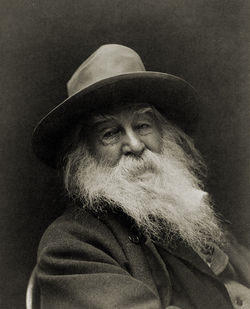Walt Whitman
Walter Whitman (1819 - 1892) was an American journalist, essayist and poet. Whitman is now considered to be one of the founders of modern American poetry.
Whitman was the prototype of the American self-made man. Born in West Hills, Long Island, New York, he started as an office boy in a law firm, worked a while as a printer, then as a village school teacher, founded several magazines, built houses, and meanwhile continued working on his magnum opus, Leaves of Grass. Whitman never married, never left America, never sought after wealth and property, did not belong to any club, preferred the company of ordinary people and was always optimistic and cheerful. People who knew him well described him as slow moving, tolerant, democratic, responsive, and generous to everyone. He provided vivid, first-hand witness to the sufferings of wounded Civil War veterans. He passed away while living in Camden, New Jersey
Leaves of Grass
Whitman's best known work, and his magnum opus, is the poetry collection Leaves of Grass, a book-sized open written in a flowing free verse style. As well as shorter poems (notably 'A Noiseless Patient Spider'), Leaves of Grass consists mainly of three long poems: ‘I Sing the Body Electric,' ‘The Sleepers,' and ‘Song of Myself'. Whitman first self-published it in 1855 and continued revising it until his death. Considered his most personal and political work, it is also now considered a masterpiece of American literature.
Reception of his poetry
Whitman's work received only moderate attention from the public during its first decade. The material was sometimes controversial, celebrating all functions of the human body in ways that did not fit in with the Victorian ethics of the time. Outside the U.S.A., the reception was much better, especially in France, where Whitman's humanism influenced the naturalist literary movement. By 1865, Leaves of Grass had made Whitman famous and was at last accepted by a major publishing house.
A group of those poems about the Civil War is sometimes published separately under the title Drum-Taps.
Reading Leaves of Grass
To read Leaves of Grass is a little like wandering in a wild summer meadow. Much of the meadow may consist of disordered piles of wildflowers, plants, sticks, straws, brambles, tangles, and dense bushes. But here and there will be found open areas of astounding beauty. Consider this passage (ref to be added):
And consider this enduringly popular, perfect gem of a small poem: (Noiseless)
